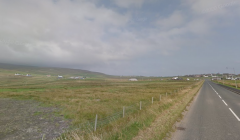Council / Local shop grant scheme welcomed – but questions raised over eligibility
A NEW grant funding scheme for local shops in Shetland has been given a relatively warm welcome from councillors on its first airing in the chamber.
But there were questions over how the funding ceiling for shops in Scalloway and Brae stands to be lower than those in other areas – and that Lerwick retailers will not be able to apply.
Shetland Islands Council (SIC) intends to use a portion of the UK Government’s new Shared Prosperity Fund allocation for the scheme to support the development and sustainability of rural shops by improving their facilities and amenities.
It would offer capital grants of up to £10,000.
Applicants would be able to apply to the scheme more than once, but they would not receive cumulative grant support greater than £10,000. The minimum grant awarded would be £1,000.
However, it is being proposed that the maximum level of cash available to shops will be determined by their location; under the plans Lerwick premises would not be eligible, and Scalloway and Brae shops would be able to attract a grant of up to 25 per cent of the project’s costs.
Shops in all other locations in Shetland would be able to receive up to half of the project costs.
The indicative funding for the scheme is £46,676 in 2023/24 and £135,199 for 2024/25.
Priority would be given to projects which improve energy efficiency, reduce carbon consumption and contribute to Shetland’s net zero ambitions.
The proposal was supported by members of the SIC’s development committee on Wednesday, and it is due to be signed off at the policy and resources session next week.
The UK Shared Prosperity Fund is the replacement for EU Structural and Investment Funds (ESIF) following Brexit.
Shetland has been allocated around £1.9 million for the period between 1 April 2022 and 31 March 2025.
Become a member of Shetland News
A report to councillors on the retail grant scheme highlights the essential service local shops in Shetland provide.
“This support has been particularly crucial and evident in the last few years, not least the role local shops played in maintaining vital services to communities during the Covid-19 pandemic, and the adverse weather experienced in late 2022,” it added.
But it notes that due to high costs of transportation, energy and maintenance, combined with low footfall, “many shops have difficulties financing works to maintain sustainability and improve services”.
At Wednesday’s meeting questions were raised by Lerwick members Cecil Smith and Stephen Leask, and Shetland Central councillor Davie Sandison, about the differing levels of funding available for shops.
Sandison said the proposed reduced grant levels for shops in Scalloway and Brae may not be enough to “cut it”.
And Leask said shops in Lerwick also faced difficulties, including competing with the two supermarkets.
Business development team leader Neil Henderson said shops in the more rural areas were seen as more fragile – with the provision in Lerwick for example “much stronger”.
He said the funding scheme also reflected that shops in the more outlying areas also acted as “community hubs”.
Henderson told councillors that the SIC had identified 26 possible businesses that would be eligible for the scheme, and there would not be enough funding to go around if they all applied for the same maximum grant.
He suggested that if the scheme was opened up to all, and to the same grant level, then it would risk “diluting” the money available.
Meanwhile Leask asked if the council knew the difference between the money incoming from the UK Government’s Shared Prosperity Fund and that which previously came from Europe.
Development director Neil Grant said he believed there was less coming from the government scheme.
During debate Shetland West member Liz Peterson said she understood the concerns about eligibility.
But she said: “I do feel that the rural shops in the rural areas need this to ensure their businesses are sustainable.”
Peterson added that profit margins for outlying shops are “very, very tight” given their reduced footfall.
Shetland North councillor Emma Macdonald also spoke up for the provision in her village of Voe, while Leask said during the Covid pandemic rural shops became a “lifeline” for communities.
Become a member of Shetland News
Shetland News is asking its many readers to consider paying for membership to get additional features and services: -
- Remove non-local ads;
- Bookmark posts to read later;
- Exclusive curated weekly newsletter;
- Hide membership messages;
- Comments open for discussion.
If you appreciate what we do and feel strongly about impartial local journalism, then please become a member of Shetland News by either making a single payment, or setting up a monthly, quarterly or yearly subscription.















































































